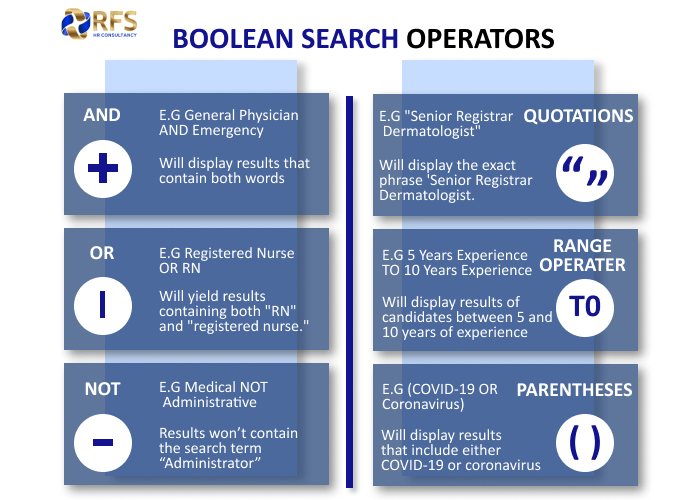Sourcing candidates is considered one of the most critical pillars of the recruitment life cycle, especially when finding candidates in complex industries like health care and medical sciences.
Most of the time, professionals for healthcare recruitment are not readily available on social media platforms, and recruiters need specialized search strategies to reach out to the relevant talent pool.
Some of the most commonly used search types used by talent acquisition specialists in this regard are keyword search, implicit search, semantic search, indirect search, and boolean search, among others.
Although all the search types are productive, boolean search is considered the most effective and efficient strategy for healthcare recruitment. Boolean search allows recruiters to combine different keywords and operators to enhance the accuracy and relevance of their search results.
This method enables them to narrow down their search criteria and find candidates with specific qualifications, experience, and skills required for health care roles.
Here arise questions like what a boolean search is, how it works, and how an effective boolean search can be conducted. But worry not; in this blog, we will be shedding light on all these questions while providing real-life examples of Boolean strings to help you understand the concept in a better way.
Let’s begin comprehending the idea of boolean search and how to search for health care professionals with the help of boolean search.
Table of Contents
Boolean Search
Boolean search is a powerful tool that allows recruiters to combine keywords and operators to create complex search queries, also known as boolean search strings. Recruiters can use boolean operators such as “AND,” “OR,” and “NOT” to refine their search. These operators are used to include or exclude any terms or requirements.
This method allows recruiters to quickly and effectively screen candidates based on their desired qualifications, experience, and skills. This targeted approach ensures that recruiters are able to identify the best candidates for roles in the medical sciences and make informed hiring decisions.
Boolean Search Operators
Boolean search works on logical operators, which are the conjunctions used to make interlinked search strings. Generally, six operators are used in boolean searches: AND, OR, NOT, range operator, parentheses, and quotations.
Let’s examine these operators comprehensively to understand their usage and placement to perform effective and accurate searches in health care recruitment.

- AND: The AND operator combines two or more search terms and retrieves results that include all of those terms. For example, searching for “general physician AND emergency” will display results that contain both words.
- OR: To search for terms and retrieve results that contain any of the terms, use the OR operator. For instance, looking up “registered nurse OR RN” will yield results containing both “RN” and “registered nurse.”
- NOT: The NOT operator is used to exclude specific terms from the search and get results that do not include those terms. For example, searching for “medical NOT administrative” will display results related to medical profiles but exclude any results related to administrative work.
- Range Operator “TO”: The range operator finds the results within the due range. For example, a healthcare recruiter can use the range operator “TO” to find candidates with a certain experience level. Searching for “5 years’ experience TO 10 years’ experience” will display the results of candidates with between 5 and 10 years of experience in the medical field.
- Parentheses (): This particular operator is used to group search terms together and control the order of operations. For example, searching for “(COVID-19 OR coronavirus) AND (vaccine OR treatment)” will display results that include either COVID-19 or coronavirus and also include either vaccine or treatment.
- Quotations “ ”: quotation marks can be used to search for an exact phrase. For example, searching for “Senior Registrar Dermatologist” will only display results that include the exact phrase “Senior Registrar Dermatologist” rather than individual instances of the words “Senior Registrar” and “Dermatologist.”
How to Make Boolean Search Strings in Healthcare Recruitment
As of right now, we are aware of the operators. Let’s examine how to use these operators together to generate search strings when recruiting for medical positions. In this section, we will also explore some of the real-life examples of boolean search strings in healthcare recruitment to give you a better understanding of their practical application.
For instance, if you are looking for a pediatrician, you can start by identifying all the related keywords, like pediatric doctor, child specialist, etc.
Once you have shortlisted all the keywords, you can move on to grouping those keywords with the help of quotation marks, parenthesis, and the OR operator, like:
- (“Pediatrician” OR “child specialist” OR “pediatric doctor”)
Moving forward, suppose you have more requirements and want results that include those requirements. You can use the operator AND to give a prompt to the search engine.
For example, if you want a pediatrician in the UAE or specifically in Dubai, and he must have expertise in emergency pediatrics, you can modify the prompt accordingly, like:
- (“Pediatrician” OR “child specialist” OR “pediatric doctor”) AND “UAE” AND “Dubai” AND “emergency pediatrics”
Now, if you want to exclude any requirement, you can use the operator NOT in the search string, e.g:
- (“Pediatrician” OR “child specialist” OR “pediatric doctor”) AND “UAE” AND “Dubai” AND “emergency pediatrics” NOT “geriatrics”
This will help you exclude professionals with geriatric experience or any other keyword that you want to exclude from your search. The most imperative aspect of Boolean search is that you can specify the result for specific sites or platforms by just adding the site name at the start, like:
- Site: LinkedIn.com/ In (“Pediatrician” OR “child specialist” OR “pediatric doctor”) AND “UAE” AND “Dubai” AND “emergency pediatrics” NOT “geriatrics”
But here, the twist is that most of the time, life care professionals are not readily available on social media platforms, which makes it crucial to avoid getting specified on any site and customize your boolean accordingly. For this purpose, you can use the following extensions at the start:
- (intitle:resume OR inurl:resume OR intitle:cv OR inurl:cv OR intitle:vitae OR inurl:vitae)
This will extensively broaden your search, and you will go through a larger pool of potential candidates.
Examples of Search Strings in Healthcare
We learned how to make search strings earlier in this article. Now, let’s explore some examples of how these search strings can be applied in lifecare recruitment.
- Orthopedic Surgeons with Sports Medicine and Robotics Experience:
- “orthopedic surgeon” AND “sports medicine” AND (“robotics experience”OR”robotic surgery”)
- Neonatal Nurse Practitioners with NICU Leadership Experience:
- “neonatal nurse practitioner” AND (“NICU leadership” OR “NICU management”)
- Cardiologists with Interventional Cardiology Experience and Board Certification:
- “Cardiologist” AND “interventional cardiology” AND (“board-certified” OR “board eligible”)
These are some generic searches medical recruiters utilize, along with the extensions mentioned earlier, to specify and complement the search.
Final Remarks
To conclude, we have analyzed the concept of boolean search, what the boolean operators are, and how to use those logical operators to perform successful sourcing in the healthcare recruitment process.
If you are a curious fellow and want to keep yourself updated with the latest practices in HR, follow our blog, and if you are looking for a healthcare recruitment agency, contact our expert recruiters to consult.




